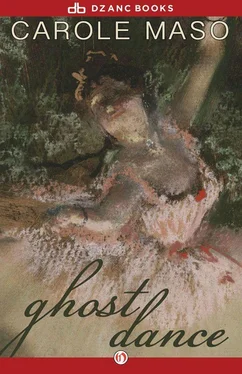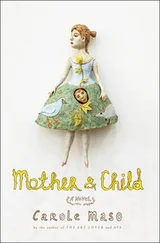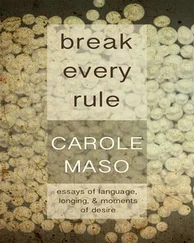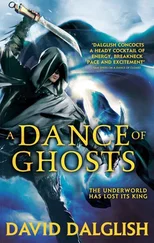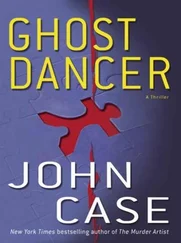Racing through this January, I understood finally that my mother’s physical symptoms were very real because, as I flew by children dragging sleds through snow, I felt nauseated and dizzy. Pain cracked like ice in my head. I wanted only to stop, to examine the birch’s silver, to lose myself in a flurry of birds, in a community of ants, to skim the thick sleep of the woodchuck and rest there for a while.
By the time I got to Vassar Brothers Hospital, Marta had passed through the doorway into the last room, where she stayed, sleeping, able to see Natalie, I suppose, but not with her yet.
“She slit her wrists,” the doctor said, “like a pro. She knew exactly what she was doing.…” His voice did not fall like it naturally does at the end of a sentence, and I knew there was more. “She took at least thirty barbiturates,” he said in a soft voice. “She has slipped into a coma.”
Your hair waves a million times toward me — a lovely curling sea. I move close to you and bathe in its soothing motion as it rises and falls on my face. I could almost drown in it. I could almost become its darkness, forget about everything, forget about you, Marta, as you have forgotten about me.
I take one curl and pull it taut from her head. I wrap my finger around it, feel its oily film on my thumb and on the tip of my forefinger. I slip my finger into another curl, then another, let them recoil. I pull one, I pull two, three, tighter and tighter until her head nearly tumbles from the bed and into my lap. You do not protest; you do not object — you have become so unlike yourself.
I pull your curls and they recoil, falling back into their dark nest where fish seem to swim in and out of your tangled tunnels. Snails curl around your ears in tendrils, humming their snail sounds. And there are starfish, too, that dangle at your neck. Marta, in your hair is a whole world. I see as I look closer even the butterfly shrimp in your curls, plodding on, feeding on death, a scavenger like me. I pull another curl, then another. I watch them bounce back. Marta, why? Why? It is beautiful hair, alive on your head.
I, too, fell into sleep, mimicking Martas half-life, her patterns of breath, her slowing pulse. I tried to follow her into the hallway of death and yank her back to the place where we were up to our elbows in henna. But day after day she slept, beautiful in her repose, not moving, barely breathing.
“You are my brown berry,” I whispered to her, touching her smooth, tanned face, “deep, deep inside a bramble bush, far, far off in the heart of the forest.” I could not reach her.
Sabine opens the large French windows and breathes deeply as the air of the ocean enters the house. It is strangely warm and cool at the same time. She takes my mother’s hand. She feels snow in the air.
They stare out at the smooth breast of the beach, the lovely white belly of the beach. They watch the ships yearning toward shore through fog. The land seems to extend its arm and curve around each hull, offering its pale embrace.
There’s a signal out there: a red light, then a white, then another white from the lighthouse tower. Something shines in the distance. Like a sleepwalker, my mother floats out onto the glass porch. It looks like crystal to her.
“An iceberg,” Sabine says, pointing to the place my mother has begun to go.
The lighthouse voice is filled with longing. The iceberg emits a ray of bright light. Only my mother can hear its lonely, snow tone.
When the phone call came at three in the morning with its unmistakable ring of death, I thought that it was Marta who had finally passed from the last room to the lovely porch where Natalie sat waiting. I was not thinking of my mother. I think now that I might have warned her that night, might have done something to prevent what happened. I had watched for days the world drain of color, the way it always had when she was going away; but I misinterpreted that blanching badly. I thought it had something to do with Marta, who with each hour was slipping further and further away. I thought the whiteness of the world had something to do with her whom I had begun to love.
My mother died of what they would call severe burns when our 1973 Pinto was rammed by a car at a tollbooth on the Connecticut Turnpike. The Pinto’s rear end collapsed on impact, the gas tank ruptured, and the car burst into flames. She was sitting in the back seat where she liked it best. Death was instantaneous.
My mother died of what would be called severe burns, but later Fletcher would say that when he lifted the coffin as one of four pallbearers it seemed as if it was empty. She must have exploded into bits.
Death was instantaneous.
A one-time Ford engineer testified at the trial that the Pinto’s design was not balanced. He said that, for cost reasons, it was designed to withstand only a twenty-mile-per-hour crash.
At the trial, the lawyer attempted to prove that Ford was well aware of the Pinto’s vulnerability but that after a cost-benefit analysis a conscious decision was made not to install a $6.65 part that could help protect the tank
It was at the New Haven tollbooth that the car in back, having lost control in the ice and snow, slid into ours. They were nearly home.
From behind closed doors, three loud hurrahs could be heard in the executive boardroom at the Ford Motor headquarters in Dearborn, Michigan.
They had been acquitted.
Death was instantaneous.
The Pinto collapsed on impact, its fuel tank ruptured, and the car burst into Flames. My father and brother both received second-degree burns but man-iged to get themselves out of the front seat of the car. She never had a chance.
Before her eyes the highway opened up like a field and slowly filled with snow, he looked up into the white sky at the dance of flurries. As they neared home in the small red car, the snow fell harder, transforming the landscape, suddenly she noticed that they were in the center of a blizzard. No one, not even Fletcher, had expected such a storm. He shook his head at the unpredictability of the weather. He was no better at it now, after years of study, than he was as a little boy.
“Oh, it’s so wonderful!” she gasped, and her voice ached with the beauty of it. Fletcher turned around and looked at her.
“Mother,” he said, but he did not articulate his sentence, for he saw that she was not listening: it was beautiful, and it called out to her, and she was not afraid.
Father never took his eyes from the road. He was always a careful driver. “Painfully careful,” my grandfather used to say.
“We’re almost home,” Father said. “The roads are very bad, but we’re almost home.”
Home, she thought. How wonderful to be in the center of snow and to be going home. She closed her eyes as Father pulled up to the tollbooth.
I hope that her eyes were closed and that she did not turn around in the last second and, seeing the car behind her sliding on the ice, know what would happen. Did she call out? Perhaps. It was so close to her, she felt she might call out to it and with her voice hold it back. But I hope she was too tired or preoccupied or just too settled in that tiny back seat to look out the window behind her. I hope that her eyes were closed or at least that she stared ahead into the snow, ordered the last few objects left on the landscape, and held that final word “home” in her mouth, and that the word home carried her through the explosion and over to the other side safely.
There could not have been time for my father or brother to have helped her. I hope that is true — that there was no moment in which to hesitate or make a decision, no split second for them to live with for the rest ot their lives, wishing they had done differently. No, there would not have been time to have done anything. There are a few things I know for sure: I loved her more than my own life. She was beautiful and wise. She never had a chance.
Читать дальше
